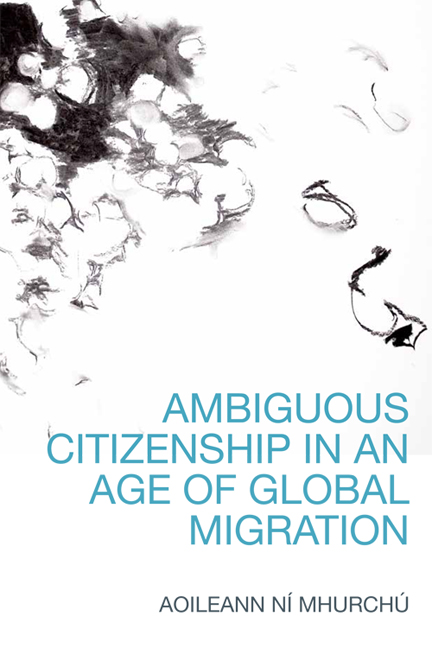Book contents
- Frontmatter
- Contents
- Acknowledgements
- Abbreviations
- Translations
- Introduction
- 1 Exploring the Citizenship Debate: The Sovereign Citizen-Subject
- 2 A Lens: The 2004 Irish Citizenship Referendum
- 3 Trapped in the Citizenship Debate: Sovereign Time and Space
- 4 Interrogating Sovereign Politics: An Alternative Citizen-Subject
- 5 Challenging the Citizenship Debate: Beyond State Sovereign Time and Space
- 6 Traces Rather than Spaces of Citizenship: Retheorising the Politics of Citizenship
- Conclusion
- Bibliography
- Index
1 - Exploring the Citizenship Debate: The Sovereign Citizen-Subject
- Frontmatter
- Contents
- Acknowledgements
- Abbreviations
- Translations
- Introduction
- 1 Exploring the Citizenship Debate: The Sovereign Citizen-Subject
- 2 A Lens: The 2004 Irish Citizenship Referendum
- 3 Trapped in the Citizenship Debate: Sovereign Time and Space
- 4 Interrogating Sovereign Politics: An Alternative Citizen-Subject
- 5 Challenging the Citizenship Debate: Beyond State Sovereign Time and Space
- 6 Traces Rather than Spaces of Citizenship: Retheorising the Politics of Citizenship
- Conclusion
- Bibliography
- Index
Summary
Citizenship will continue to name a political practice that is plausibly monopolized by the modern state … [Yet it] also names a site at which our constitutive account of what we are supposed to be will become less plausible, and where the highly problematic character of what we think politics is and where it occurs will become increasingly pronounced … There is no point in pushing at these limits … without also pushing at the account of modern subjectivity which has been produced by, and is productive of, those limits.
R. B. J. WalkerBeing political means being implicated in strategies and technologies of citizenship as otherness.
Engin IsinThe ‘people’ cannot be taken as an already established notion: rather it consists of an act of permanent creation and recreation.
Étienne BalibarAt present, dominant trends in citizenship scholarship frame the question of citizenship in terms of two opposing perspectives: one particularistic (exclusive), one universalistic (inclusive). The politics of citizenship is posited here as a trade-off between these diverging models. This first chapter argues that a new growing body of citizenship literature – explored here through the work of Etienne Balibar, Engin Isin and R. B. J. Walker – provides an alternative focus. It does so by challenging this dualistic framework as the necessary basis for discussions about citizenship. As the above quotations indicate, in their work Balibar, Isin and Walker emphasise the link between politics and subjectivity; in particular, how the latter takes its meaning from the former. It does not take for granted that subjects engage in statist politics, as sovereign autonomous beings.
This chapter argues that existing citizenship scholarship needs to be seen as one overarching debate which presents a spectrum of possible, yet limited, interpretive choices which are defined by a particular reality of what it means to ‘be’ a citizen (a political subject) in terms of sovereignty and autonomy, rather than a series of competing debates. The first part of the chapter explores the dominant intellectual and theoretical explanations for the two main theoretical models which have dominated citizenship scholarship.
- Type
- Chapter
- Information
- Ambiguous Citizenship in an Age of Global Migration , pp. 27 - 57Publisher: Edinburgh University PressPrint publication year: 2014



